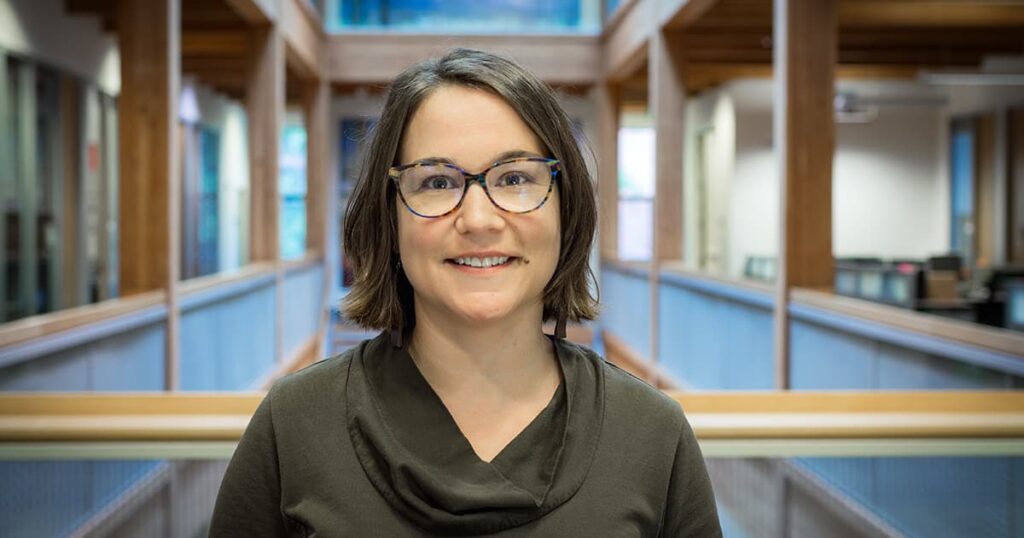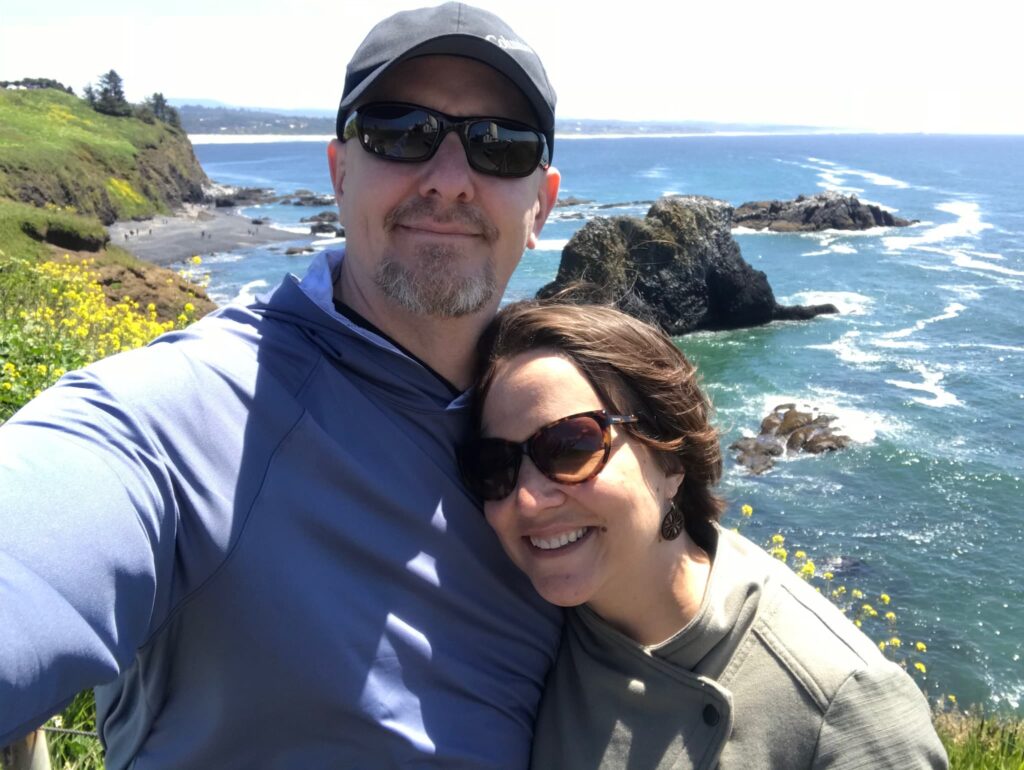
It began with leaving – with promises of visits to family and hope that her budding career would continue to flourish. It got rolling with a life-changing, cross-country move with her husband, Eric: rescue dogs Teddy, Tessa and Davinci; an armload of guitars; and more than 30 years of treasured and useful belongings. Three years later, she’s finally “arrived.”
Boundless energy packed in a petite frame and curious brain, Allison Myers may be more than 2,500 miles from her former home, but she’s putting down roots in Oregon’s public health ecosystem as deep as the firs around her.
In 2020, the Oregon Public Health Association recognized her with its Emerging Leader Award for outstanding leadership, dedication, innovation and creativity, as well as her efforts to build capacity to address a range of factors affecting the public’s health.
Although awards make her “deeply uncomfortable,” she appreciates her peers’ acknowledgement.
“It means that a ton of people have trusted me with their time and have welcomed me. And that feels amazing,” she says. “To leave your family and show up in a place, on a prayer that it will be OK, feels really special right now. We left North Carolina with no complaints; there was a lot I could have done there.
“But there is really something special where public health meets health care, and when I learned about this position as director of the Oregon State University Center for Health Innovation, I was like, ‘Wow, a brand-new college of public health and human sciences with Extension in a place where you’ve got both public health modernization and value-based care for Medicaid. That’s incredible.’
“We changed our lives so I could be a part of something. And it’s really nice to feel like I’m part of something.”
Connector, mentor, difference-maker
Growing up in central Pennsylvania, Allison was passionate about public health issues – the environment, sex education and tobacco use – before she knew what “public health” meant.
Through her research into the spread of HIV among sex workers along trucking routes, dispensing condoms and sex education with the AIDS Project, and serving two years as a Peace Corps volunteer in the country of Gabon, she began to learn, and her passion only grew.
Her formal training began with a master’s degree in public health and led to a doctoral degree in heath behavior from the Gillings School of Global Public Health at the University of North Carolina at Chapel Hill. Putting her training into practice, she conducted marketing and branding research for health care clients. She then started her own company, Counter Tools, a non-profit offering citizen scientists data collection and mapping software, training and technical assistance related to implementing health policy.

As a Robert Wood Johnson Health Policy Fellow, she contributed to federal health policy legislation and oversight as a health legislative assistant to Sen. Sheldon Whitehouse, (D-RI).
She puts all of that experience into play as director of OSU’s Center for Health Innovation, where she connects faculty and students with external partners on projects related to integrating social needs care within the health care system, creating healthy neighborhoods and environments, promoting mental health and preventing substance use, and modernizing Oregon’s local public health system.
She seems to have her finger in every pie these days – her favorite being her grandmother’s pecan pie, with loads of dark Karo syrup. Her work “pies” include overseeing community health worker training, a food security project, and an outdoor recreation economy initiative with AARP and OREI; hiring and mentoring nine graduate students; writing a slew of grant and research proposals totaling nearly $6 million; partnering with college and OSU Extension faculty on the Coast to Forest mental health initiative; running a COVID-19 call center and training contact tracers dispatched by the Oregon Health Authority; co-teaching two graduate-level courses on health policy; and even moderating the webinar series Public Health Insider.
“I’m really proud of the food security project with Linn County Public Health because it’s responsive and meets a need,” she says. “We’re thinking about how we approach food security, not from providing food, but from the level of how you change the system. I’m also super pleased with our college’s commitment to equity. It is the heart of public health in my very humble opinion.”
In addition to projects currently in motion, she also volunteers with Samaritan Evergreen Hospice, is treasurer on the Shangri-La Oregon Board of Directors, and serves as the healthy environments representative and chair for the Oregon Public Health Association’s development committee. She just signed up for a weekly Spanish language course and spends many hours off the clock nurturing students, in part because of the support she lacked, and later gained, during her own education.

“When I was an undergrad, I never did an internship. I worked between 20 and 30 hours a week in a restaurant, making sure I could pay my $400 rent. My advisor told me that she didn’t know why I would want to study sociology as my minor for environmental resource management, and now, fast-forward 25 years, and that’s exactly what I’m thinking about – people and their environments.
“Then, as a master’s student and doctoral student, I was supported by amazing people who cared enough to add me to their calendar. Honestly, that’s why I do it. I feel like it was shown to me how you foster the development of others.
“I was told very clearly at Carolina that my success is measured by the success of my students, period. And so that’s why I do it, even though it’s not technically required of me. It should be required of me! It’s part of our land grant mission and it’s one reason why it’s OK for us to be humble, to take our lessons and to keep going.”
Learn more about the Oregon State University Center for Health Innovation, housed in the College of Public Health and Human Sciences.